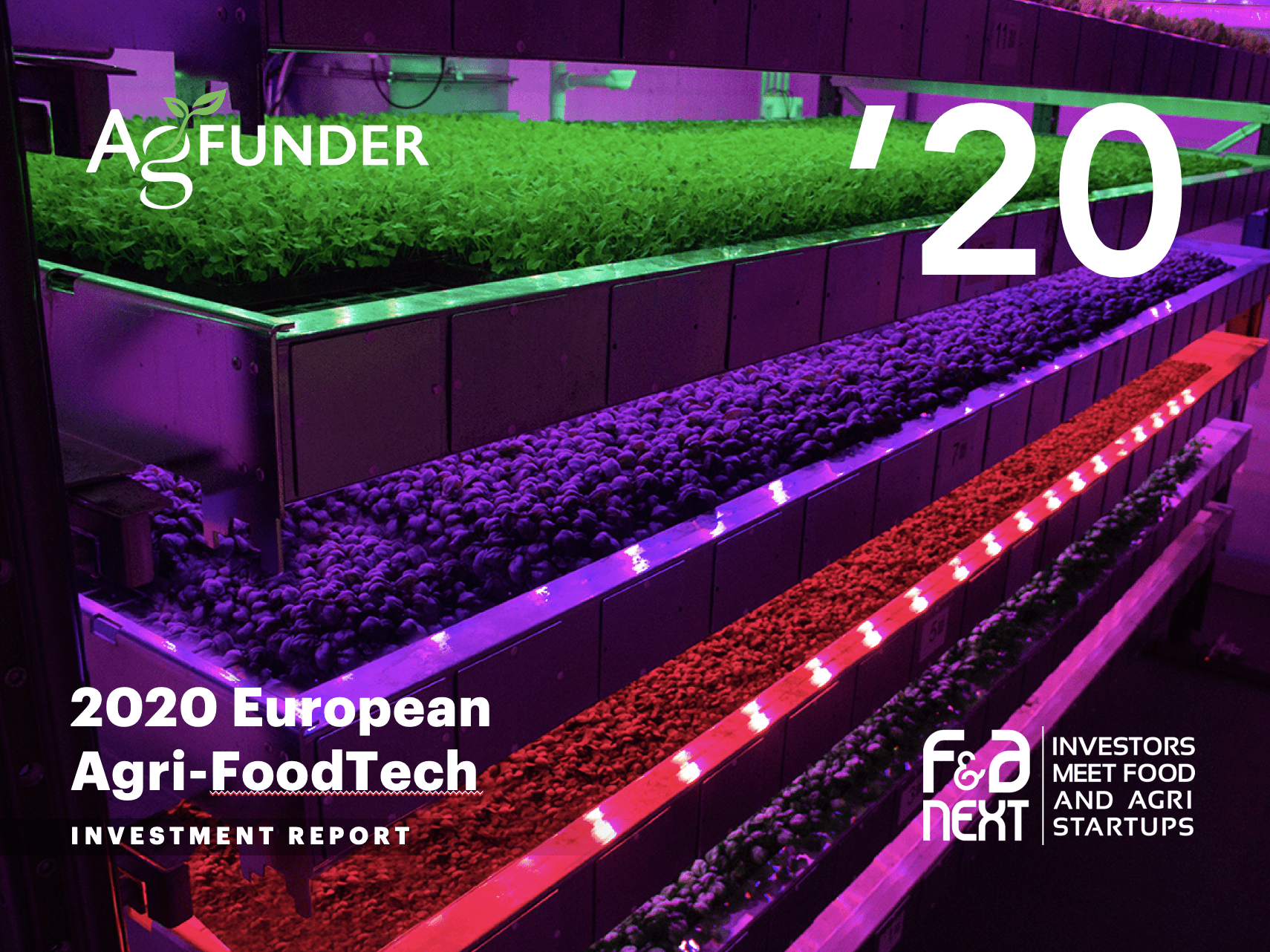European Agri-FoodTech startups raised $3.4 billion in funding in 2019 across 419 deals, a 70% year-over-year growth, according to new research from AgFunder in collaboration with F&A Next. Looking ahead to 2020, the picture is not so rosy with early indications of more muted funding levels between January and March of this year as the startup industry across sectors started to feel the impacts of the coronavirus pandemic.
For those who missed out on AgFunder founding partner Rob Leclerc’s online “report premiere” at the virtual version of the F&A Next conference last week, the report can now be downloaded here.
The report features many seemingly prescient deals considering how Covid-19 has impacted the food industry and consumer eating habits. A mammoth $575 million Series G for Restaurant Marketplace Deliveroo in the UK was a huge and timely spinach can of capital considering the spiked demand for online food delivery amid the Covid-19 pandemic. The Amazon-backed Deliveroo deal, which only got provisional regulatory approval in the aftermath of the UK’s lockdown policy, ended up turbo-boosting the investment in downstream startups — those operating close to the consumer — to $2.1 billion — 110% growth year-over-year. It also boosted a declining Restaurant Marketplace category — a global trend — as leaders like Deliveroo extend their dominance and leave newcomers struggling to gain traction.
Upstream startups — operating in the supply chain and on the farm — raised $1.1. billion, a 22% year-over-year growth.
If there was any Deliveroo-esque turbo-booster for upstream in Europe, it was France’s robotized mealworm farmer Ynsect. Excluding North America, this was the largest upstream deal in the world in 2019, with its $125 million Series C round led by the impact fund Astanor.
2019 with 202o hindsight
As with AgFunder’s 2020 Farm Tech Investment Report, the chance to wade through 2019 dealflow makes for interesting reading with 2020 hindsight. There are aspects of all investment categories that have been either accelerated by the arrival of Covid-19 on the continent, or blown out the water by the wing-flaps of a black swan.
Whatever shape a new normal takes, quite a few agrifoodtech investors can feel like they were prescient in they invested in eGrocery and Cloud Retail Infrastructure – a new AgFunder category encompassing ghost kitchens and last-mile delivery services supporting at-home dining and food purchases. The same goes for Novel Farming Systems — which includes vertical farming operations, for instance — that are having a moment because of a heightened awareness of the importance of localizing supply chains.
Less fortunately, investment in In-Store Restaurant Tech increased year-over-year. While many of these technologies rapidly pivoted to help restaurants cater to at-home dining, there will no doubt be a fall-out in this category, at least for now.
The same goes for a 2020 fall-out in capital inflows more generally into early-stage investments anywhere, according to AgFunder’s head of research Louisa Burwood-Taylor. “It would be fallacy to assume investment levels will continue to grow, even though early estimations of around $500m in funding for Q1 2020 seemed to be on the right track,” she writes in the preface alongside Jan Meiling of StartLife and Jeroen Leffelaar of Rabobank, both founders of the F&A Next consortium.
The trio see a tougher year ahead for those seeking to raise capital in 2020, but they do believe the sector should hold ground owing to the fundamental social and environmental importance of putting nutritious food on tables affordably and sustainably.
Cashing in on a biotech tradition, and waking up agribusiness markets
Building off a proud biotech tradition on the continent, several of the largest agrifoodtech fundings in Europe went to Ag Biotech companies. Overall, the segment saw a 21% uptick in investment value to $277 million from $229 million. Deal activity remained stable. Topping the charts was Spain’s PlantResponse Biotech, a Madrid Technical University spinoff that secured debt and equity investment in part to fund its acquisition of Koch’s biological business.
There was a boom in Europe’s Innovative Food category in 2019. Investments increased by 224% year-on-year from $83.2 million to $270 million. Of particular note here, and perhaps even skewing the numbers, is Perfect Day Foods, which started life at the Rebel.Bio accelerator in Ireland, hence its inclusion in this European report. The company raised the year’s two largest rounds in the category for its dairy-free ice cream and ingredients company: a $35 million Series B in February and a $140 million Series C in December, both with Singapore state fund Temasek, and Hong Kong billionaire Li Ka-shing’s Horizons Ventures.
Elsewhere, Europe has a less than laggard’s reputation when it comes to investing in what the report describes as Agribusiness Marketplaces. These use the internet to connect farmers more efficiently with suppliers, distributors, and customers. And typically, Europe has trailed the rest of the world when it comes to investing here, partly because of the persistence of entrenched and personalized supply chain partnerships that date back decades. However, the continent has been slowly but surely waking up to digital possibilities here. In 2018, startups in the category secured $25.4 million – a 166% increase on the previous year. In 2019, investment consolidated, hitting a total of $23.4 million across just nine deals — down from 14 recorded for 2018 this time last year. (AgFunder portfolio company Wefarm, which is headquartered out of London but operates in West Africa, led the way with the category’s biggest deal for its $13 million Series A involving Germany’s June Fund and Silicon Valley’s True Ventures.)
If there’s any category that pretty much stayed at even keel in 2019 in Europe it was Farm Management Software & IoT at $108 million of investments, up by a whisker from $107 million. Deal numbers saw a more significant drop-off, however, falling 27% year-over-year to 44. The top-funded startup in the category was Paris-based Outsight — previously known as Dibotics — which has created a “3D semantic camera” to give autonomous vehicles such as robots, drones, and trucks enhanced “situational awareness.”
Another theme the report unpacks is how Europe’s eGrocery startups pulled in over $545m across 44 deals last year — a 21% year-on-year increase in dollar terms despite a 37% drop in the number of transactions. Most of the category’s deals were in the six or seven-figure range, though a handful of much larger investments stood out from the crowd. The top deal involved Amsterdam-based Picnic, which is reviving the ‘milkman’ concept by delivering fresh dairy products and other grocery staples to customers’ doorsteps using electric vehicles. Its November Series C round was followed by $55m in debt financing from ABN Amro.
Why does UK top the charts
In a country-by-country sense, the UK topped the European agri-foodtech funding charts in 2019, tallying more than the next two contenders — Spain and France — combined. The UK’s $1.1 billion total accounts for one-third of Europe’s overall total for 2019, propped up by Deliveroo’s bumper $575 million round. Exclude that Deliveroo deal, and things look a little bit less Rule Brittannia — the UK, France, and Spain would then be roughly equal in funding. The top five countries – the UK, France, Spain, the Netherlands, and Germany – make up nearly 80% of all funding raised across the continent in 2019, and the report takes a closer look at the keys to success in these national ecosystems.
Alessio Dantino of Forward Fooding serves up a few explanations of what’s been powering the British ecosystem. “Companies like JustEat, Open Table, Ocado and Quorn were born post-dot com and paved the way for newcomers by disrupting the market,” he writes in the report. “Generous tax incentives for early-stage businesses along with government-backed initiatives such as Innovate UK, have delivered millions of pounds of funding and resources to Food Tech entrepreneurs, kickstarting their ventures.”
With the prospect of exits on the horizon, Anterra Capital offers its own look ahead from that perspective. One element to watch for is in hospitality, given the coronavirus pandemic’s impact there: “It is clear that the hospitality sector and its technology providers are being hit disproportionally hard, with lockdowns in place all over Europe. This could result in the number of bargain-hunting acquisitions increasing in the second half of the year, with better funded, surviving players snapping up their bankrupt rivals.”
Any thoughts on the report? Let us know at [email protected]





